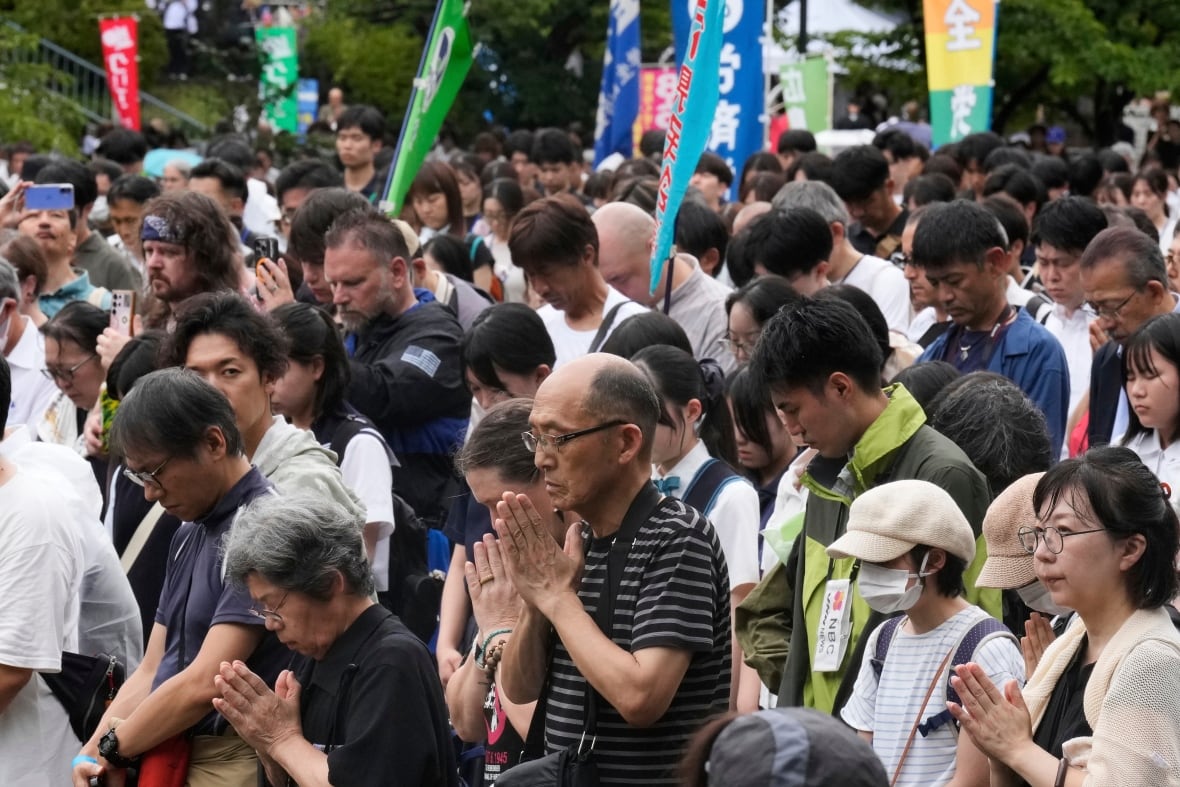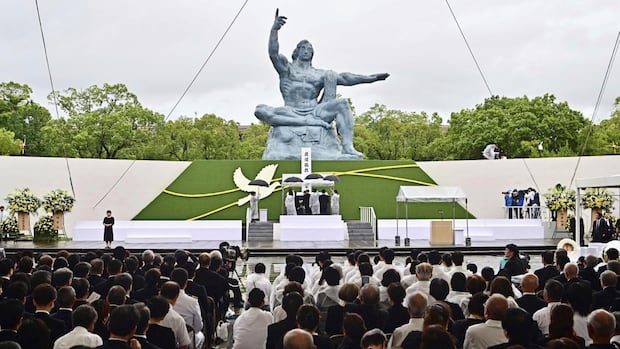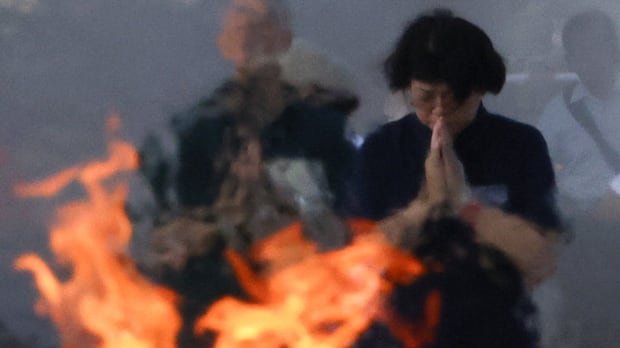The southern Japanese city of Nagasaki on Saturday marked 80 years since the U.S. atomic attack that killed tens of thousands and left survivors who hope their harrowing memories can help make their hometown the last place to be hit by a nuclear bomb.
The U.S. launched the Nagasaki attack on Aug. 9, 1945, killing at least 70,000 people by the end of that year, three days after the bombing of Hiroshima that left some 140,000 dead. Japan surrendered on Aug. 15, 1945, ending the Second World War and the nearly half-century of aggression by the country across Asia.
About 2,600 people, including representatives from more than 90 countries, attended a memorial event at Nagasaki Peace Park, where Mayor Shiro Suzuki and Prime Minister Shigeru Ishiba were among the guests who spoke.
At 11:02 a.m. local time, the exact time when the plutonium bomb exploded above Nagasaki, participants observed a moment of silence as a bell rang.
“Even after the war ended, the atomic bomb brought invisible terror,” survivor Hiroshi Nishioka, 93, said in his speech at the memorial. He added that many who didn’t have severe wounds experienced symptoms later, including bleeding from their gums and losing hair, before dying.
“Never use nuclear weapons again or we’re finished.”

Dozens of doves, a symbol of peace, were released after a speech by Suzuki, whose parents are survivors of the attack.
He said the city’s memories of the bombing are “a common heritage and should be passed down for generations” in and outside Japan.
“The existential crisis of humanity has become imminent to each and every one of us living on Earth,” Suzuki said. “In order to make Nagasaki the last atomic bombing site now and forever, we will go hand in hand with global citizens and devote our utmost efforts toward the abolition of nuclear weapons and the realization of everlasting world peace.”
‘A world without war’
Survivors and their families gathered Saturday in rainy weather at Peace Park and nearby Hypocenter Park, located below the bomb’s exact detonation spot, hours before the official ceremony.
“I simply seek a world without war,” said Koichi Kawano, an 85-year-old survivor who laid flowers at the hypocentre monument decorated with colourful origami paper cranes and other offerings.
Others prayed at churches in Nagasaki, home to Catholic converts who went deep underground during centuries of violent persecution in Japan’s feudal era.
The twin bells at Urakami Cathedral, which was destroyed in the bombing, also rang together again after one of the bells that had gone missing following the attack was restored by volunteers.
A new pop-up exhibition at Ottawa`s City Hall honours the victims and survivors of atomic bombs dropped on Japan near the end of the Second World War.
Despite their pain from wounds, discrimination and illnesses from radiation, survivors have publicly committed to a shared goal of abolishing nuclear weapons. But they worry about the world moving in the opposite direction.
Aging survivors and their supporters in Nagasaki now put their hopes of achieving nuclear weapons abolition in the hands of younger people, telling them the attack isn’t distant history, but an issue that remains relevant to their future.
“There are only two things I long for: the abolition of nuclear weapons and prohibition of war,” said Fumi Takeshita, an 83-year-old survivor. “I seek a world where nuclear weapons are never used and everyone can live in peace.”
In the hope of passing down the lessons of history to current and future generations, Takeshita visits schools to share her experience with children.
“When you grow up and remember what you learned today, please think what each of you can do to prevent war,” Takeshita told students at one school earlier this week.
Teruko Yokoyama, 83, is vice-chair of the Nagasaki Atomic Bomb Survivors Council, and said the growing absence of those she had worked with fuels her desire to document the lives of others who are still alive.
That total has fallen to 99,130, about a quarter of the original number, with their average age exceeding 86.
Survivors worry about fading memories, as the youngest of the survivors were too young to clearly recall the attack.
Hiroshima on Wednesday marked the 80th anniversary of the U.S. atomic bombing of the western Japanese city, with many aging survivors expressing frustration about the growing support of global leaders for nuclear weapons as a deterrence.
“We must keep records of the atomic bombing damages of the survivors and their lifetime story,” said Yokoyama, whose two sisters died after suffering illnesses linked to radiation.
Her organization has started to digitize the narratives of survivors for viewing on YouTube and other social media platforms with the help of a new generation.
“There are younger people who are beginning to take action,” Yokoyama told The Associated Press on Friday. “So I think we don’t have to get depressed yet.”
PM pledges to promote dialogue
Survivors are frustrated by a growing nuclear threat and support among international leaders for developing or possessing nuclear weapons for deterrence. They criticize the Japanese government’s refusal to sign or even participate in the Treaty on the Prohibition of Nuclear Weapons as an observer because Japan, as an American ally, says it needs U.S. nuclear possession as deterrence.
In Ishiba’s speech, the prime minister reiterated Japan’s pursuit of a nuclear-free world, pledging to promote dialogue and co-operation between countries with nuclear weapons and non-nuclear states at the Non-Proliferation of Nuclear Weapons review conference scheduled for April and May 2026 in New York. Ishiba didn’t mention the nuclear weapons ban treaty.
“Countries must move from words to action by strengthening the global disarmament regime” with the Treaty on the Non-Proliferation of Nuclear Weapons (NPT) at the centre, complemented by the momentum created by the nuclear weapons ban treaty, said UN Secretary General António Guterres, in his message read by Undersecretary General Izumi Nakamitsu in Nagasaki.
Nagasaki invited representatives from all countries to attend the ceremony on Saturday. The government in China notably notified the city that it wouldn’t be present, without providing a reason.
The ceremony last year stirred controversy because of the absence of the U.S. ambassador and other Western envoys in response to the Japanese city’s refusal to invite officials from Israel.


